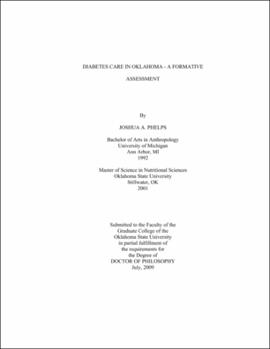| dc.contributor.advisor | Hermann, Janice R. | |
| dc.contributor.author | Phelps, Joshua A. | |
| dc.date.accessioned | 2013-11-26T08:26:20Z | |
| dc.date.available | 2013-11-26T08:26:20Z | |
| dc.date.issued | 2009-07 | |
| dc.identifier.uri | https://hdl.handle.net/11244/6865 | |
| dc.description.abstract | Scope and Method of Study: Through a series of interviews guided by the tenets of grounded theory, this study explored the community's perspectives regarding the delivery process of diabetes care and education. For the sake of this project, community referred to a collective of individuals receiving and providing services. As each individual has a role in directing the impact of the delivery and reception of care, each interviewee was viewed as a stakeholder in the care process. Investigating this collective of perspectives on the delivery process of diabetes care and education provided an opportunity to gain an insider's point of view. Through content analysis, themes were developed and reported along with associative results in an effort to investigate existing alliances between parties engaged in the handling and management of diabetes, and to uncover potential for developing new alliances. | |
| dc.description.abstract | Findings and Conclusions: This study illuminated an array of issues facing the process of delivering diabetes care and education. Reflected in the perceptions of individuals engaged in the process of diabetes care and education are opportunities for improving the delivery process. One opportunity in particular is to facilitate a move away from parallel care practices to a more integrated approach. A major objective in completing this project was to evaluate the potential for developing alliances between parties engaged in handling and management of diabetes. Based on the results of this project many avenues exist for potential implementation of alliances. In particular, Cooperative Extension has an enormous opportunity to lay the ground work for revolutionizing diabetes care for low-income older Oklahomans. Services currently available coupled with the introduction of additional services would facilitate a state-wide effort to reduce and/or control diabetes among disparate populations throughout Oklahoma. By exploring these alliances and investigating additional avenues of action, associative factors which lead to development of the themes Diet Dilemma , Don't Know What We Don't Know , Expendable Time , Reluctance , Support/Exchange Experience , Disrupted Care , and Fragmented Alliances may be illuminated and addressed. | |
| dc.format | application/pdf | |
| dc.language | en_US | |
| dc.rights | Copyright is held by the author who has granted the Oklahoma State University Library the non-exclusive right to share this material in its institutional repository. Contact Digital Library Services at lib-dls@okstate.edu or 405-744-9161 for the permission policy on the use, reproduction or distribution of this material. | |
| dc.title | Diabetes care in Oklahoma - A formative assessment | |
| dc.contributor.committeeMember | Hildebrand, Deana A. | |
| dc.contributor.committeeMember | Muske, Glenn | |
| dc.contributor.committeeMember | Whitacre, Brian | |
| osu.filename | Phelps_okstate_0664D_10444 | |
| osu.accesstype | Open Access | |
| dc.type.genre | Dissertation | |
| dc.type.material | Text | |
| thesis.degree.discipline | Nutritional Sciences | |
| thesis.degree.grantor | Oklahoma State University | |
